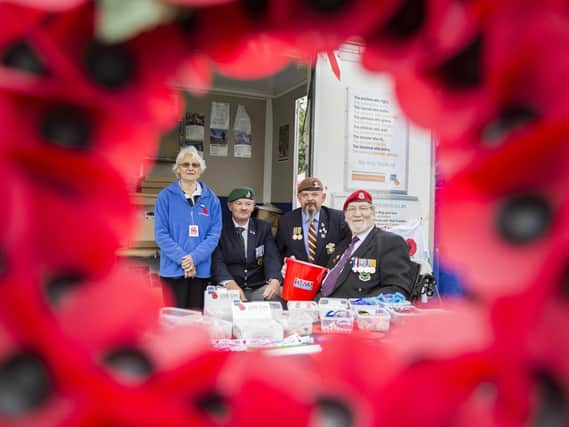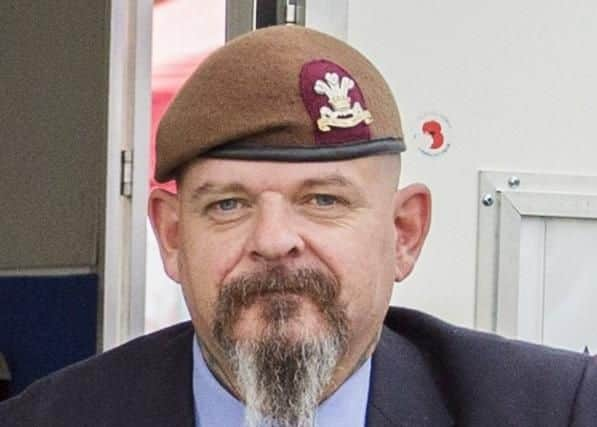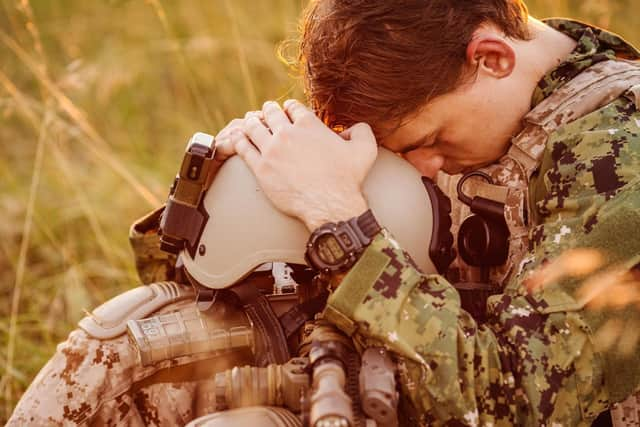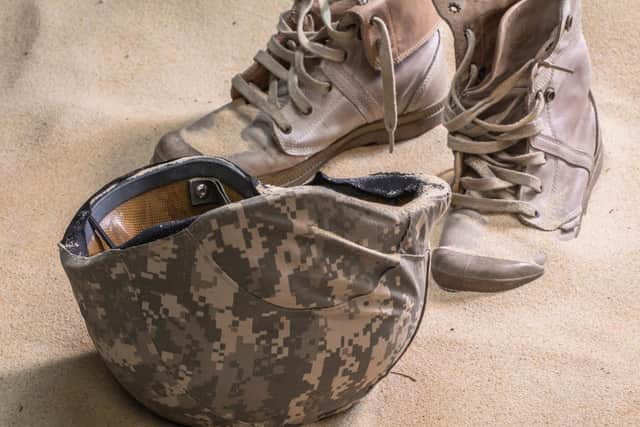Northampton former serviceman pleas for better veteran support after Army flashbacks led him to the brink of suicide


A former serviceman who saw friends crushed in horrific training accidents has recalled how his time in the Army- and the bullying he endured - led him to try and take his life twice.
Andy Somerville may not be here if, on the day he positioned himself on top of a railway bridge in Banbury, there had not been a drivers’ strike on that day.
Advertisement
Hide AdAdvertisement
Hide AdToday, working as a groundsman for a series of schools in his hometown, the 53-year-old has learned to live with his demons, thanks to a pioneering form of therapy.


But between the late 1980s and 2016, Andy’s life was filled with intense, lucid flashbacks, bouts of anger and an alcohol addiction brought on by his time in the Army.
“My mum always said my Andrew went into the Army nice, but the horrible Andrew came out,” said the dad-of-two.
Andy was just 17 when he joined up to the Royal Hussars Main Battle Tank Regiment and remembers spending his 18th birthday on guard duty at Catterick garrison in North Yorkshire.
Advertisement
Hide AdAdvertisement
Hide AdHe liked heavy metal, tanks and spending time outdoors as a young man. The Army, was the only career he ever considered.


But his service - of six years and 169 days - was peppered with traumatic events, all experienced before his 25th birthday.
In his secondary role as a field medical assistant in Alberta Canada, Andy saw his tank commander ‘Frenchie’ crushed during a training exercise.
Andy was only 20 when he was tasked with removing the stricken body,
Advertisement
Hide AdAdvertisement
Hide Ad“I can still see Frenchie in the dust with his eyes open,” he said.


“Everything in his body had been crushed.
“But it didn’t have an immediate effect on me. That came much later.
“I remember my bosses’ original response was to say take the night off and boys and drink some beer. That’s just what you did on those days.”
Earlier that year, in 1986, training in Germany, Andy had seen another colleague crushed when a Challenger tank rolled backwards off down a hill. The victim was still alive when he arrived on the scene, but passed away within minutes.
Advertisement
Hide AdAdvertisement
Hide AdIn 1987 he was the first on the scene when a helicopter hit a set of powerlines in training.
Andy still remembers the screams of the commander coming from the wreckage.
But much of Andy’s trauma could be traced back even further.
Shortly into his career as a main battle tank crewman, he was posted out to the Fallingbostel training camp in North Germany.
Advertisement
Hide AdAdvertisement
Hide AdBut Andy entered a tightly-knit regiment, where newcomers were initiated in tough ways.
“No one had joined my regiment for 18 months - I was the new boy,” he said.
“They called it ‘getting tuned in’. It was about getting you used to your new world and it mainly involved drinking.
“But if you didn’t want to go for a drink - they would beat you up until you did.
Advertisement
Hide AdAdvertisement
Hide Ad“At the time I was only about ten-and-a-half stone. But they would go out of their way.
“Sometimes I would end up with black eyes and a broken nose. But you couldn’t report it because it would make a name for yourself.”
He eventually left the forces, after returning back to England in 1989.
The dad-of-two remembers handing his ID card and walking out on June 30 of that year.
Advertisement
Hide AdAdvertisement
Hide AdReintegrating back into normal life was hard. He left the forces with no qualifications to his name and, without realising, was beginning to show the early signs of deteriorating mental health.
It was not long before the hallucinations started; soon he became prone to bursts of anger.
His coping mechanism, like many was to turn to drink.
“Little things would make me blow up,” he said. “But it escalated and escalated.
“I just began to spiral down.
“If you keep stuff bottled up for so long you become like a fizzy bottle of drink someone has shaken. It’s only a matter of time before the top pops off.”
Advertisement
Hide AdAdvertisement
Hide AdIn late 1989, he found himself stood on top of the railway bridge in Banbury, “summoning up the courage to jump off.”
“I kept thinking to myself ‘not long now’, not long now’ for a train to come” said Andy, describing the time he spent waiting for a train to come.
“I remember my friend found me and said ‘you’ve picked the wrong day mate. The train drivers are on strike’.”
Andy believes there are hundreds of people from his age group who left the military with no means of psychological support for what they had seen.
Advertisement
Hide AdAdvertisement
Hide Ad“You couldn’t talk about this stuff while you were in the Army,” he said. “Though I don’t think it’s as bad now.
“The attitude you got was ‘well you knew what you were doing when you signed up for it.”
In 2000 Andy took an overdose of prescription painkillers.
It was only as a result of his wife Ellyn’s intervention that he eventually sought professional help and undertook eye movement desensitization and reprocessing therapy in 2016.
The treatment uses rapid eye movement to overcome the effects of Post Traumatic Stress Disorder.
Advertisement
Hide AdAdvertisement
Hide AdNow Andy rarely gets the flashbacks - though he knows hundreds like him may be suffering in silence.
He is still in touch with two former colleagues who suffer from PTSD. He knows of others who have taken their own lives.
That is why Andy, whose 20-year-old daughter now serves in the Army, has thrown his support behind our campaign to see suicides by former military personnel recorded by coroners.
He believes the figures would be a vital tool in helping us realised the full effect of PTSD on veterans.
“The Ministry of Defence definitely didn’t do enough,” he said.
“If you wanted help you had to search for it yourself.
“No-one said ‘this is what we can do for you’.”